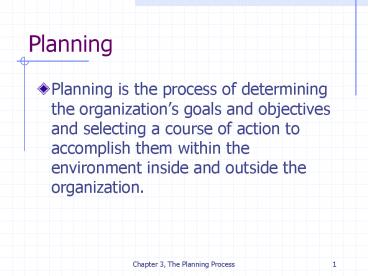Planning - PowerPoint PPT Presentation
1 / 17
Title:
Planning
Description:
Playmates. pretend. Chapter 3, The Planning Process. 4. Needs Assessment. Collecting Data ... Introduction to the needs assessment study purpose. Overview of ... – PowerPoint PPT presentation
Number of Views:203
Avg rating:3.0/5.0
Title: Planning
1
Planning
- Planning is the process of determining the
organizations goals and objectives and selecting
a course of action to accomplish them within the
environment inside and outside the organization.
2
Brainstorming
- Criticism is prohibited
- Freewheeling is encouraged and welcomed
- Quantity is wanted
- Combination and improvement sought
3
Brainstorming Activities
- Castles in the sand
- Communication gaps
- Detective work
- Make it worse
- Playmates
- pretend
4
Needs Assessment
- Collecting Data
- Demographic data
- User participation patterns
- Attitudes of employees
- Barriers to participation
- Predictions of future participation
- Appraisal of existing facilities and programs
- Health hazard appraisal
- Areas of improvement
- Analysis of Data
- Implications Drawn from the Data
5
Needs Assessment Report Components
- Title page
- Executive summary
- Introduction to the needs assessment study
purpose - Overview of methods and procedures
- Results
- Conclusions, implications, and recommendations
6
Reasons for Planning
- Helps enterprise succeed
- Provides direction and sense of purpose
- Helps manager cope with change
- Contributes to the performance of other
managerial functions
7
Steps in the Planning Process
- Identifying internal and external connections and
relationships - Development of a SWOT analysis chart
- Strengths
- Weaknesses
- Opportunities
- Threats
- Establishing objectives
- Developing premises
- Decision-making
- Implementing a course of action
- Evaluating the plan
8
Classification of Plans
- Functional plans
- Marketing
- Production
- Personnel
- Financial
- Period of time
- Short range
- Long range
- Frequency
- Standing versus single-use
9
Types of Plans
- Short Range
- Long Range
- Standing
- Single-use
- Budget
- Programs
- projects
- Strategic
10
Objectives
- Objectives are predetermined and stated in
advance. They describe future desired results
toward which present efforts are directed. - Objectives serve as
- Guidelines for action
- Constraints
- A source of legitimacy
- Standards of performance
- A source of motion
11
Pitfalls of Planning
- Delegation of planning function away from top
management - Top management becomes to involved
- Failure to clearly define and develop enterprise
goals - Failure to adequately involve major line managers
- Failure to actually use plan
- Top management makes intuitive decisions that
conflict with formal plans.
- Failure to creat a congenial and supportive
climate for planning - Assuming that comprehensive planning is something
separate - Creating a planning program that lacks
flexibility and simplicity - Fails to encourage creativity
- Top management fails to review and evaluate
long-range plans
12
Benchmarking
- Benchmarking is a process used to identify gaps
between company As performance and other
industry best practices.
13
Common Steps in Benchmarking
- Determining what to benchmark
- Prepare a benchmark
- Gather data about similar organizations
- Select benchmark companies
- Collate all information and visit the companies
- Analyzed all data gathered and communicate the
results
14
Manuals for Operations
- Scheduling
- Fitness
- Operations
- Emergency
- Inservice education
- Risk management
- Sales
- Marketing
- Repair Maintenance
- Human resources
- Fund-raising
- Employee benefits
- Special events
- Membership retention
- Recruitment motivation of volunteers
15
Effective Delegation Requires
- Delegator states a clear objective
- Delegator determines guidelines for the project
- Delegator sets the deadline for completion
- Delegator grants the person the authority to
carry out the assignment - Delegator sets the deadline for its completion
- Delegator decides best means for final report
16
Why Managers Fail to Delegate
- Nobody does it better
- Guilt
- Insecurity
- Lack of trust
- Takes time
17
Transforming a group into a Team
- Management values individual initiatives
- High level of participation v. maintaining status
quo - Employees eager to learn
- Employees with a we can solve anything attitude
- Accountability is based on process and results
- Performance management systems are aligned with
and support teams - Management is willing to walk and talk
- Strong team values are established































